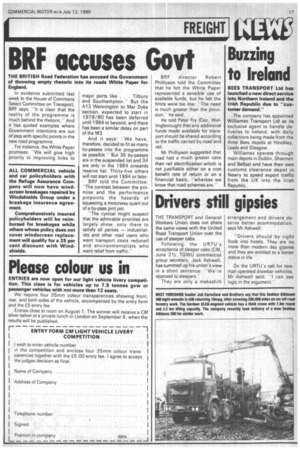BRF accuses Govt
Page 19

If you've noticed an error in this article please click here to report it so we can fix it.
THE BRITISH Road Federation has accused the Government of throwing empty rhetoric into its roads White Paper for England.
In evidence submitted last week to the House of Commons Select Committee on Transport, BRF says: "It is clear that the reality of the programme is much behind the rhetoric." And it has quoted examples where Government intentions are out of step with specific points in the new road programme.
For instance, the White Paper promises: "We will give high priority to improving links to
major ports like . . . Tilbury and Southampton.But the ,413 Wennington to Mar Dyke section, expected to start in 1979/80 has been deferred until 1984 or beyond, and there has been a similar delay on part of the M3.
And it says: "We have, therefore, decided to fit as many by-passes into the programme as possible." But 36 by-passes are in the suspended list and 34 are only in the 1984 onwards reserve list. Thirty-five others will not start until 1984 or later.
BRF told the Committee: "The contrast between the promise and the performance pinpoints the hazards of squeezing a motorway quart out of a by-pass pint pot.
"The cynical might suspect that the admirable priorities are largely show, only there to satisfy all parties — industrialists and other road users who want transport costs reduced and environmentalists who want relief from traffic.
BRF director Robert Phillipson told the Committee that he felt the White Paper represented a sensible use of available funds, but he felt the limits were too low. "The need is much greater than the provision," he said He told Peter Fry (Con, Wellingborough) that any additional funds made available for transport should be shared according to the traffic carried by road and rail.
Mr Phillipson suggested that road had a much greater case than rail electrification which is not justifiable either on a cost benefit rate of return or on a financial basis, "whereas we know that road schemes are."












































































































































